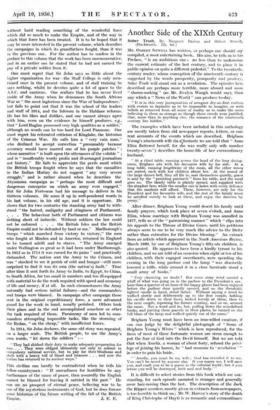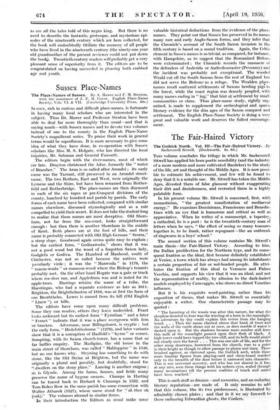Another Side of the XIXth Century
Sober Truth. By Margaret Barton and Osbert Sitwell. (Duckworth. 12s. fi(L)
Mn. OSBERT SITWELL has written, or perhaps one should say compiled, a most entertaining book. His aim, he tells us in his Preface, "is an ambitious one ; no less than to undermine the current estimate of the last century, and to place it in public opinion on quite a different pedestal." To the twentieth- century reader, whose conception of the nineteenth century is suggested by the words prosperity, pomposity and prudery, Sober Truth will stand out as a revelation. The episodes here described are perhaps more terrible, more absurd and more "shame-making" (as Mr. Evelyn Waugh would say), than any which a "News of the World" can produce to-day..
"It is in this very juxtaposition of arrogant dry-as-dust realism with events so fantastic as to be impossible to imagine, or with beliefs so removed from all sense of reality as to make the mere believing in them as strange as though these creeds were justified, that, more than in anything else, the romance of the nineteenth century lies hidden."
The examples which have been included in this anthology are mostly taken from old newspaper reports, letters, or cur- rent accounts of the events which are described. Brigham Young's nineteenth wife (in alfootnote we are told that "Anne Eliza flattered herself, for she was really only wife number twenty-seven") describes the home-life of her extraordinary husband. -
"At a third table, running across the head of the long dining. room, Brigham sits with his favourite wife by his side: At a long table running lengthwise of the room, all the other wives are seated, each with her children about her. At the sound of the large dinner bell, they all file in, seat themselves quietly, grace is said by the "presiding patriarch" from his table, and the meal goes on. The family table is plainly spread, and supplied with the simplest fare, while the smaller one is laden with every delicacy that the markets will afford. These, however, are only for the President and his favourite wife, and the rest of the family must be satisfied merely to look at them, and enjoy the dainties by proxy."
After dinner, Brigham Young would desert his family until family prayers, which took place at seven o'clock, and Anne Eliza, whose marriage with Brigham Young was annulled in 1877, tells us of the "patronising manner" which "slips into his appeals to the Throne of Divine Grace, until his petitions always seem to me to be very much like advice to the Deity rather than entreaties for the Divine blessing." An extract from an article which appeared in the North American Review, March 1890, by one of Brigham Young's fifty-six children, is also quoted. He appears to have been a kindly tyrant to his children, and we are told of an occasion when eight or ten of his children, with their engaged sweethearts, were spending the evening in the long parlour and the lamp "was discreetly lowered a trifle, while around it in a close barricade stood a small army of books."
"Very charming, no doubt ! But some stray wind carried a whiff of what was going on in the parlour to the President's ear. Less than a quarter of an hour of the happy gloom had been enjoyed before the parlour door quietly opened, and on the 'threshold, lighted candle in hand, stood father. Without saying a word he walked slowly and deliberately up to the. first couple, holding his candle down in their faces, looked keenly at them, then to the next couple, repeating his former scrutiny, and so on, around the room. Not a word said he, but, pulling down the scandalised books; and putting them gravely in their places, he turned on the full blaze of the lamp and walked quietly out of the room."
Brigham Young must have been an iron-willed creature, if one can judge by the delightful photograph of "Some of Brigham Young's Wives" which is here reproduced, for the faces of most of these fortunate women are stern enough to put the fear of God into the Devil himself. But we are told that when Amelia, a woman of about forty, refused the privi- lege of joining his harem, he "had recourse to ' revelation ' " in order to gain his bride.
" ' Amelia, you must be my wife ; Cod has revealed it to me. You can't be saved by anyone else. If you marry me, I will save you, and exalt you to be a queen in the celestial world ; but if you. refuse you will be destroyed, both soul and body.'" • It is difficult to select stories from this book which are out- standing, for each episode narrated is stranger and generally more hair-raising than the last. The description of the Jack the Ripper murders, mostly given in extracts from newspapers, is too horrible to think on ; Mr. WY. Harvey's story of the death of King Christophe of Hayti is as romantic and extraordinary as are all the tales told of this negro king. But there is no need to describe the fantastic, grotesque, and mysterious epi- sodes of the nineteenth century which are here collected, for the book will undoubtedly titillate the memory of all people who have lived in the nineteenth century (the ninety-one year old grandmother of the present reviewer could not put down the book). Twentieth century readers will probably get a very pleasant sense of superiority from it. The editors are to be congratulated on having succeeded in pleasing both crabbed age and youth.











































 Previous page
Previous page